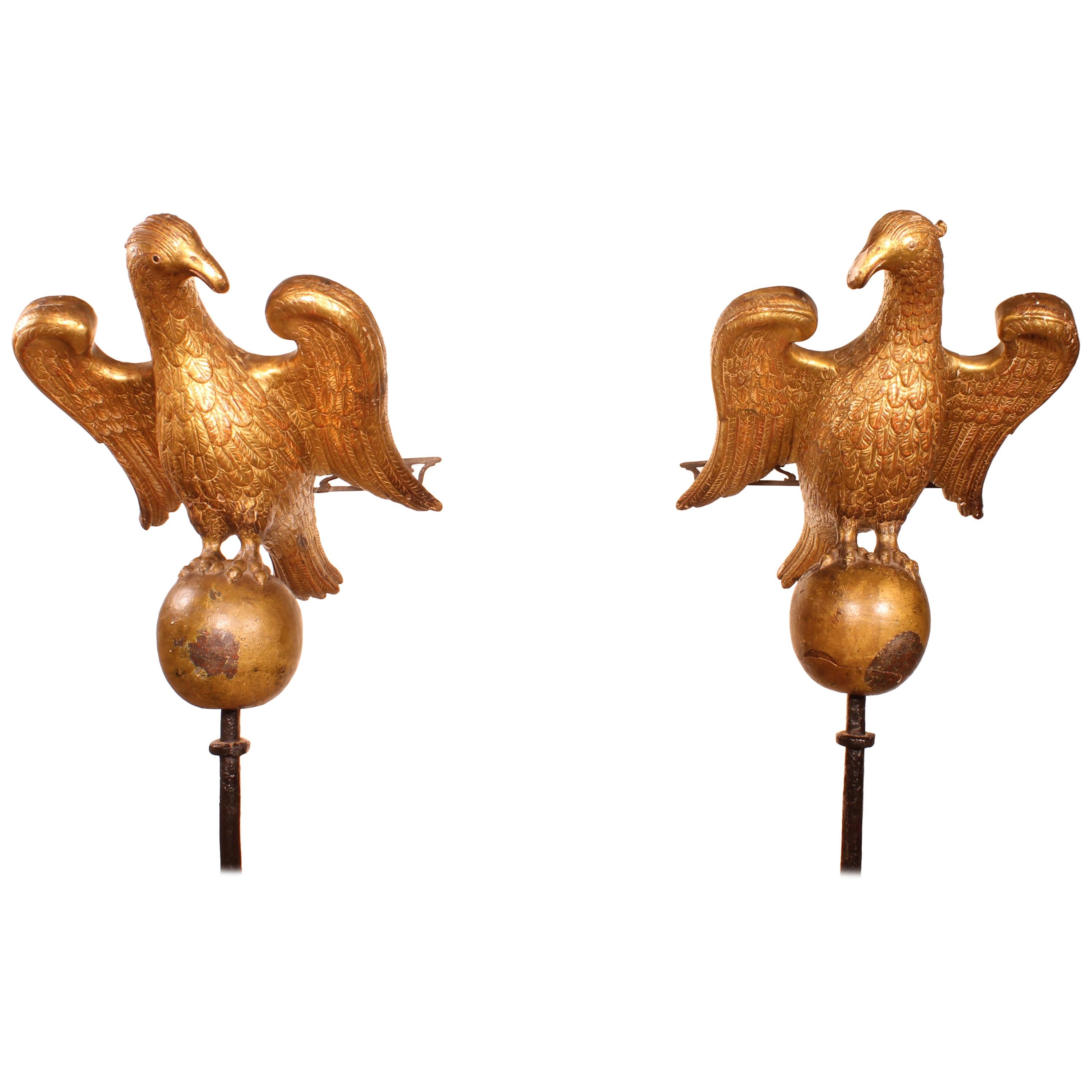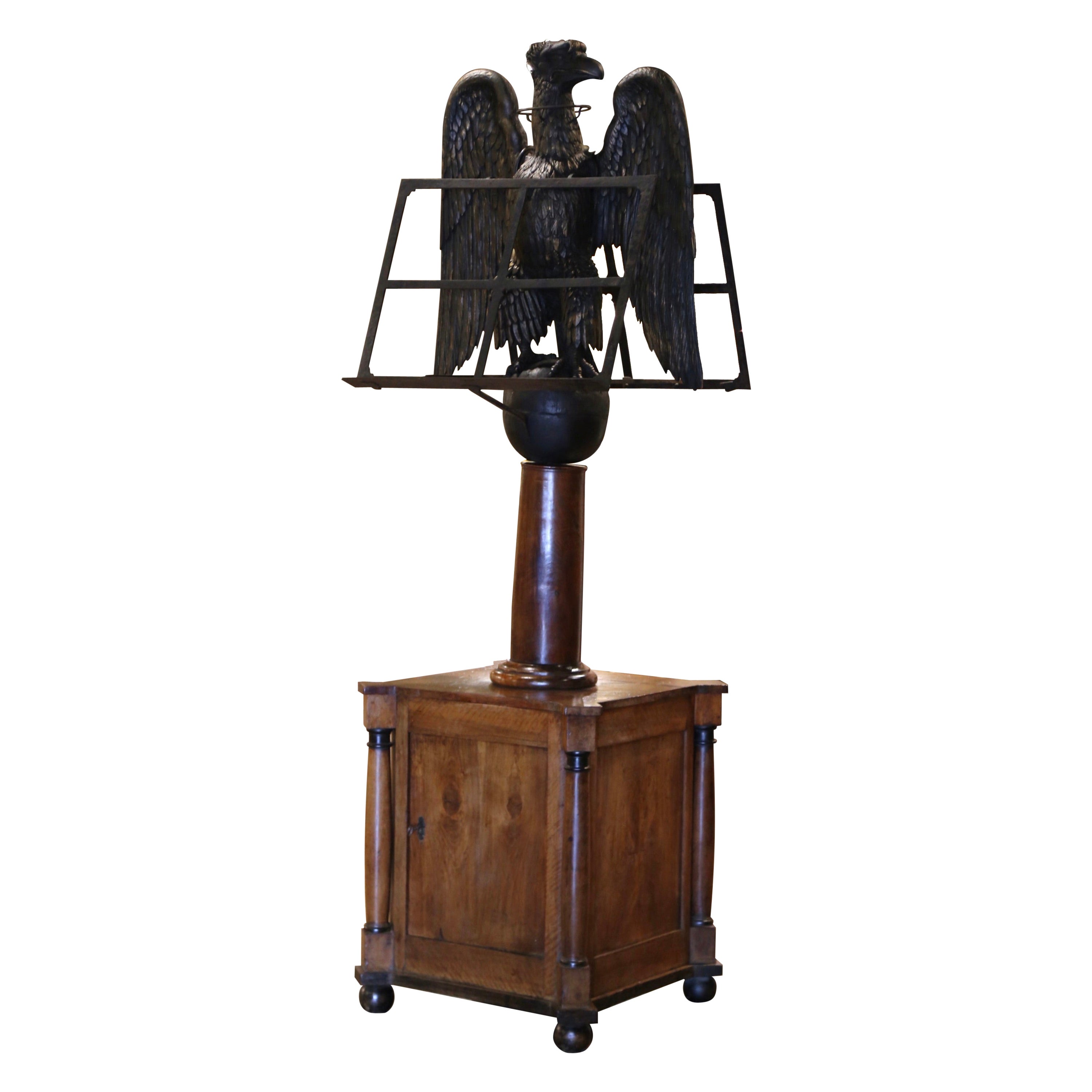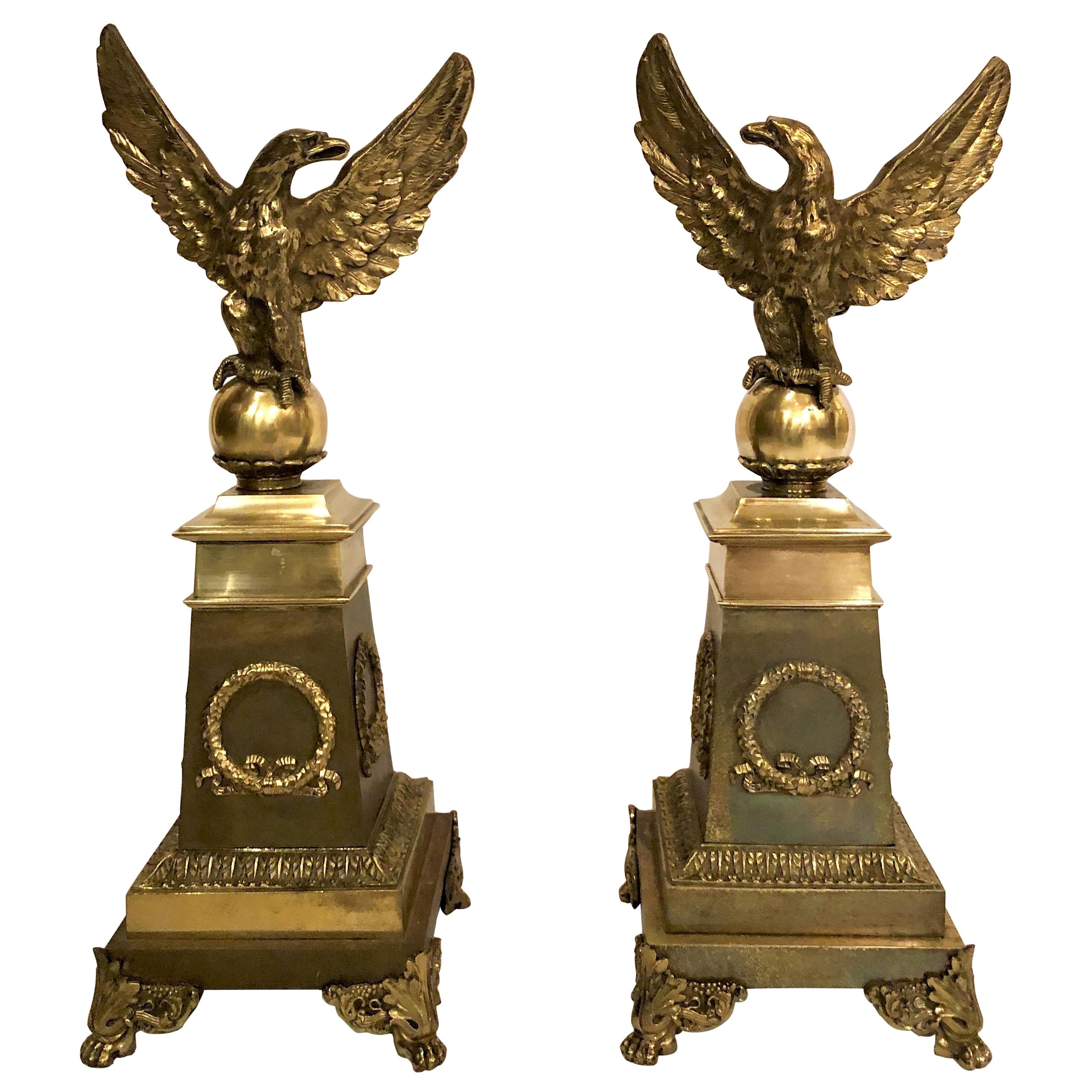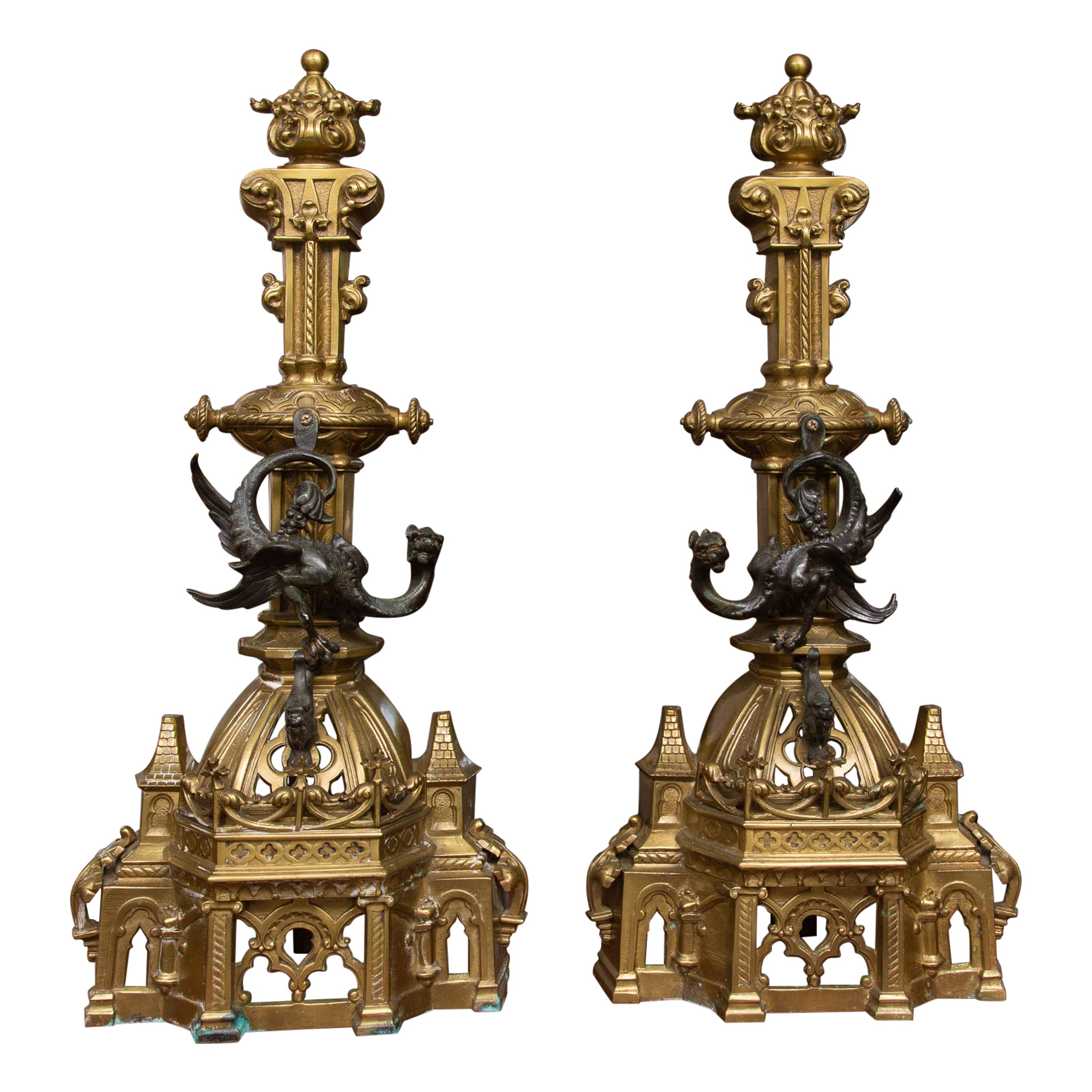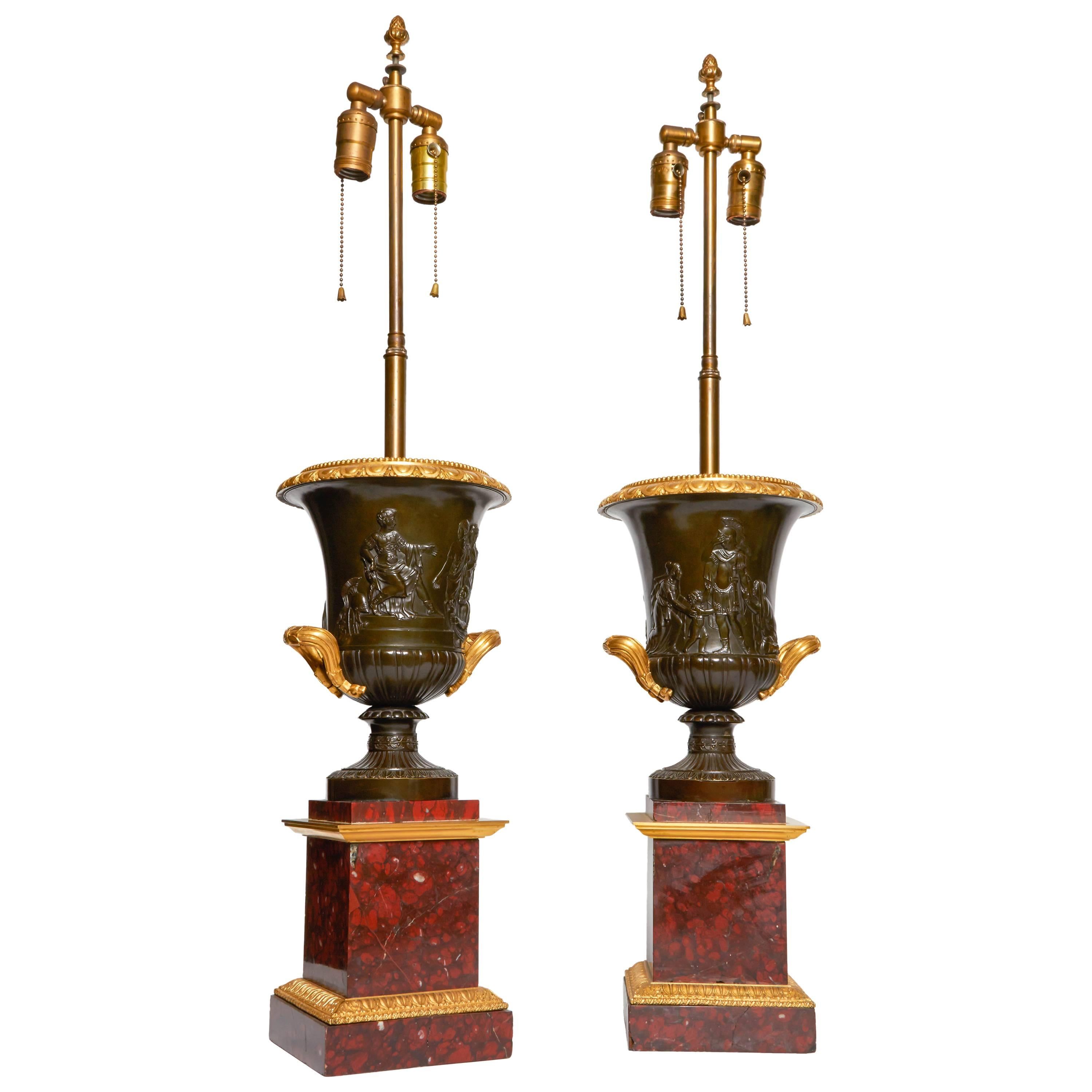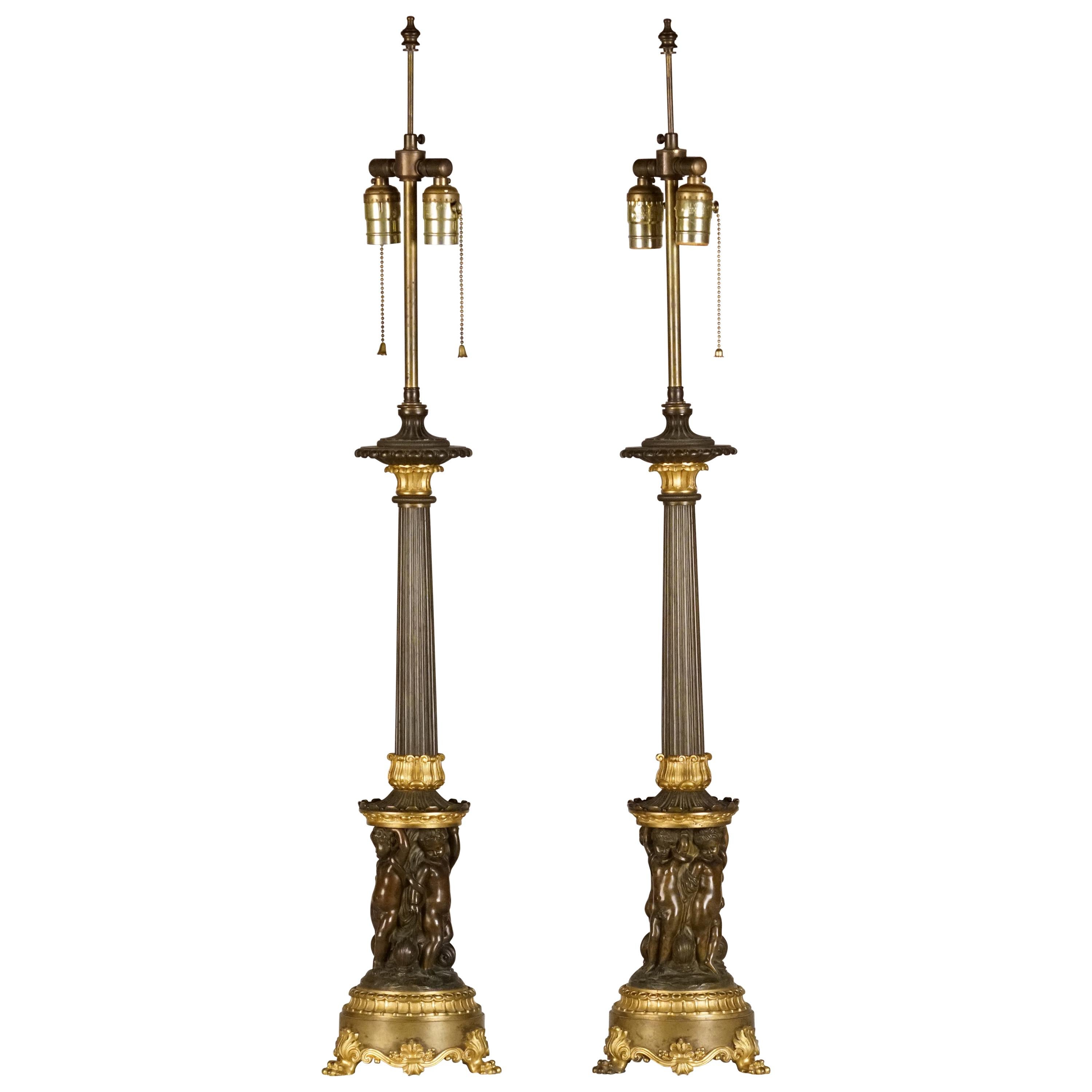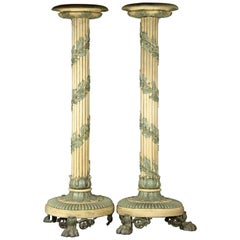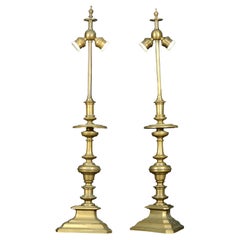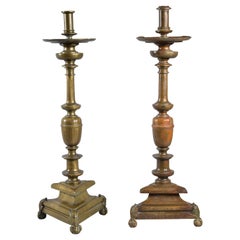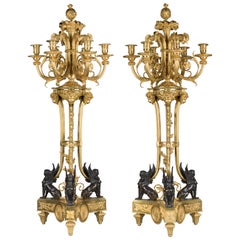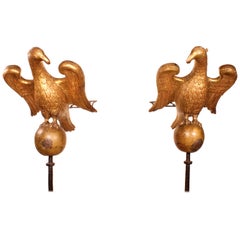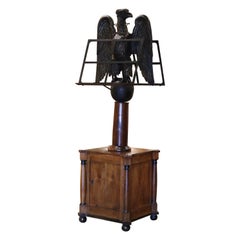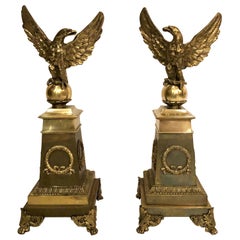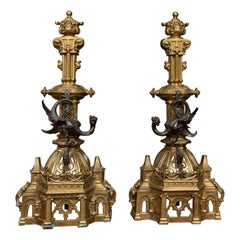Items Similar to Pair of Tall Eagle Lecterns, Bronze, Etc, 16th Century and Later
Want more images or videos?
Request additional images or videos from the seller
1 of 20
Pair of Tall Eagle Lecterns, Bronze, Etc, 16th Century and Later
$28,606.12per set
£21,181.89per set
€24,000per set
CA$39,337.70per set
A$43,747.34per set
CHF 22,899.71per set
MX$533,664.29per set
NOK 287,743.22per set
SEK 270,659.64per set
DKK 182,727.30per set
About the Item
Pair of easels in the shape of an eagle. Bronze, iron. 16th-17th century.
Rear supports.
Pair of lecterns with tripod-shaped bases, claw-shaped legs with spheres, and a triangular part from which three baluster-shaped legs emerge, with elements in light tones that join at the top of this piece , leaving a vegetal form towards the lower area. The finials are two eagles on spheres, each looking to the side with its head tilted upwards, and situated with its wings half spread; the back is smooth, without the details of the feathers, eyes, beak and claws that do show in the front. The eagles could be from the Spanish school or from the Netherlands, dating from the 16th-17th centuries, while the bases are from the 20th century. It seems that, at least in Spain, the spread of tall lecterns began in the 14th century, because they were important objects for the word contained in books, on the one hand, but also and above all, as a result of their use to support the Missal in the presbytery of the churches (previously it was supported by the acolytes and since the 9th century it was placed on a cushion on the altar) in full view of all. This also entails the increase in its use in civil environments. To the existing variants, from the mid-fifteenth century is added the one that presents on its inclined plane to hold the text an eagle with outstretched wings, sometimes with a haloed head and, on occasions, with an open beak, called by the name of the animal that presents. One of these lecterns is preserved in the Cathedral of Cuenca, another in the Parish Church of Villanueva de los Infantes (Ciudad Real), some are in private collections, etc. Likewise, it is necessary to remember its frequent use in Protestant temples, with really striking Victorian-era works. It is often thought that the presence of the eagle is linked to Saint John and his Gospel, or that it refers to an allegory of the greatness and elevation of the Word, but it must be taken into account that it was also a bird identified with the sun. (it was thought that he spent his life continuously under its rays) and with the idea of masculine activity (strength, power of flight...). It is frequently mentioned in the Sacred Texts with an allegorical meaning (Divine Protection, Christian Church...) or equating the flight of the bird with divine protection and design (Exodus 19:4: You have seen what I have done to the Egyptians, and how I have taken you on eagles' wings and brought you to myself), or linking it with the Resurrection (verse 5 of Psalm CII which reads "My youth will be renewed like that of the eagle"). Remember, for example, that Beato de Liébana affirms that the eagle is the Church, and that the wings are the two Testaments, through which it flies in the sky, or that Dante refers to the bird as "of God".
Weight: 125 kg. Size: 44x50x181 cm.
- Dimensions:Height: 71.26 in (181 cm)Width: 19.69 in (50 cm)Depth: 17.33 in (44 cm)
- Sold As:Set of 2
- Style:Renaissance (In the Style Of)
- Materials and Techniques:
- Place of Origin:
- Period:
- Date of Manufacture:16th Century
- Condition:Wear consistent with age and use. Minor losses. Minor fading.
- Seller Location:Madrid, ES
- Reference Number:Seller: zf10621stDibs: LU2951333766392
About the Seller
4.9
Vetted Professional Seller
Every seller passes strict standards for authenticity and reliability
Established in 1985
1stDibs seller since 2017
349 sales on 1stDibs
Typical response time: 17 hours
- ShippingRetrieving quote...Shipping from: MADRID, Spain
- Return Policy
Authenticity Guarantee
In the unlikely event there’s an issue with an item’s authenticity, contact us within 1 year for a full refund. DetailsMoney-Back Guarantee
If your item is not as described, is damaged in transit, or does not arrive, contact us within 7 days for a full refund. Details24-Hour Cancellation
You have a 24-hour grace period in which to reconsider your purchase, with no questions asked.Vetted Professional Sellers
Our world-class sellers must adhere to strict standards for service and quality, maintaining the integrity of our listings.Price-Match Guarantee
If you find that a seller listed the same item for a lower price elsewhere, we’ll match it.Trusted Global Delivery
Our best-in-class carrier network provides specialized shipping options worldwide, including custom delivery.More From This Seller
View AllPair of Pedestals Carved and Polychrome Wood, 19th-20th Century
Located in Madrid, ES
Pair of pedestals formed by a base elevated on lion claws with scrolls and birds, and a grooved shaft that ends in two circular moldings, decorated with plant and architectural eleme...
Category
Early 20th Century European Neoclassical Revival Figurative Sculptures
Materials
Other
Pair of Dutch Style Candlesticks, 18th Century, Bronze
Located in Madrid, ES
Pair of Dutch style candlesticks. S. XVIII
Bronze. Electrified like lamps.
Pair of Dutch-style candlesticks converted into lamp bases.
They have a turned structure, typical of the...
Category
Antique 18th Century European Neoclassical Table Lamps
Materials
Bronze, Other
Bronze Candle Holders Pair, 20th Century, after Antique Models
Located in Madrid, ES
Two bronze candlesticks. Twentieth century.
Two practically equal bronze candlesticks with a triangular base on legs (these with vegetal elements finished in claws holding balls) ...
Category
20th Century European Baroque More Lighting
Materials
Bronze
Pair of candlesticks. Bronze (blued and gilt). France, circa 1800.
Located in Madrid, ES
Pair of candlesticks. Bronze (blued and gilt). France, circa 1800.
A pair of six-light bronze candelabras, a type often called "tripod" due to their shape. A base with three projections, placed on inverted truncated pyramidal architectural elements and with reliefs and medallions on the exterior faces, serves as the base for three seated sphinxes made of burnished bronze with gilded tails. From their backs, three upward-facing rods emerge, each ending in children's heads with butterfly wings. These sphinxes are decorated with raised candelabras secured by an openwork band (note the spiraling bouquet inside). From the heads, a circular shape with projections emerges, on which the actual shaft of the candelabra rests, topped with a pomegranate on a floral arrangement. The arms of the candelabras, ending in lighters, feature delicate scrolls and rooster heads. Note the varying textures of the material and the great amount of detail present in the architectural, vegetal, and figurative elements. The design of these vase shaped candlesticks was enormously successful, and numerous variants with slight modifications were subsequently created, including sphinxes and goat heads. On April 16, 1787, François Rémond (c. 1747–1812) supplied Daguerre with eight “girandoles en trepied” (as they were often known in literature), identified by some experts as the eight candlesticks of this model purchased from Daguerre by George, Prince of Wales, later King George IV, for Carlton House. The largest, ten-light model with a vase and rooster heads, was created around 1786. A pair of this model is recorded in the 1836 Inventory of the Legendre de Lucay collection, and another pair is known to have been commissioned for Marie Antoinette's Salon des Nobles at Versailles. Compare this example with the griffin chandelier...
Category
Antique 19th Century European Other Candelabras
Materials
Bronze
Pair of Candlesticks or Candleholders, Bronze, 18th Century
Located in Madrid, ES
Pair of candlesticks. Bronze, 18th century.
Pair of bronze candlesticks, which still maintain a strong influence of Spanish Baroque models, especially in the turned axis, with promin...
Category
Antique 18th Century Spanish Neoclassical Candlesticks
Materials
Bronze
Pair of candlesticks or candle holders. Bronze. 18th century.
Located in Madrid, ES
Pair of candlesticks. Bronze. France, 18th century.
Pair of candlesticks made of bronze that have a polygonal base, stepped upwards and towards the center and enhanced with smooth m...
Category
Antique 18th Century European Neoclassical More Lighting
Materials
Bronze, Other
You May Also Like
Pair of Eagles 16th Century from North Italy Church Lectern
Located in Brussels, Brussels
Exceptional pair of aigles of the 16th century of Italy
Superbe pair of wooden sculpted aigles from the Italian Renaissance. Very Fine and delicate sculpture
The pair of eagles se...
Category
Antique 16th Century Italian Renaissance Animal Sculptures
Materials
Giltwood
19th Century French Empire Double-Side Lectern on Cabinet with Carved Eagle
Located in Dallas, TX
Decorate an office or study with this monumental One-of-a-Kind "Lutrin" (or lectern) over an attached cabinet. Crafted in France circa 1810, the bookstand is a striking piece that re...
Category
Antique Early 19th Century French Empire Music Stands
Materials
Wrought Iron
Pair of Antique French Empire Eagle Andirons
Located in New Orleans, LA
Pair of antique French Empire Eagle Andirons.
Category
Antique Late 19th Century French Fireplace Tools and Chimney Pots
Materials
Bronze
$3,900 / set
19th Century Pair of English Gilt and Patinated Bronze Andirons
Located in WEST PALM BEACH, FL
This is a stately pair of English gilt and patinated bronze andirons, depicting dragons and Gothic architectural elements. 19th century.
Category
Antique 1890s English Other Mounted Objects
Materials
Brass, Bronze
Fine Large Pair of Antique Neoclassical, Campagna Shaped Bronze Urns or Lamp
Located in New York, NY
A fine pair of antique neoclassical grand tour period, two-toned patinated and doré bronze, Campagna shaped two handled urns. Each beautifully resting on an original rouge marble pli...
Category
Antique Early 19th Century French Neoclassical Table Lamps
Materials
Marble, Bronze
Fine Pair of Empire Patinated & Gilt Bronze Candelabre, Mounted as Lamps
Located in Sheffield, MA
A fine pair of empire patinated & gilt bronze
Candelabre, mounted as lamps
1st quarter of the 19th century
Each reeded stem above drum base relief-cast with four putti on leaf-b...
Category
Antique Early 19th Century French Empire Table Lamps
Materials
Bronze
